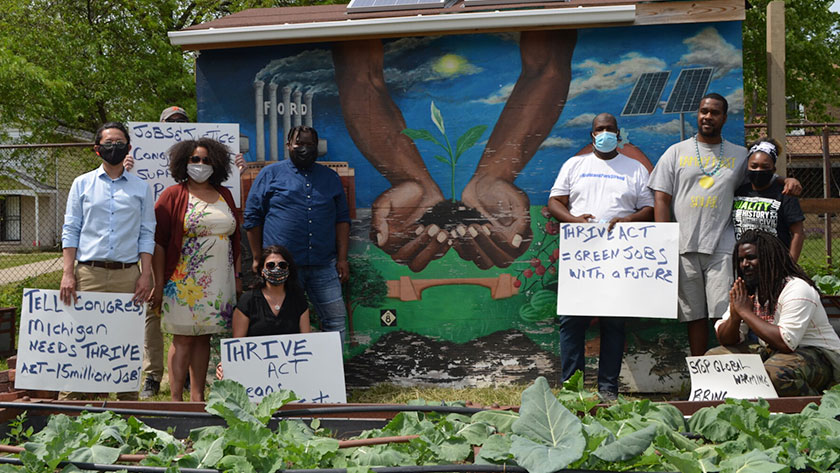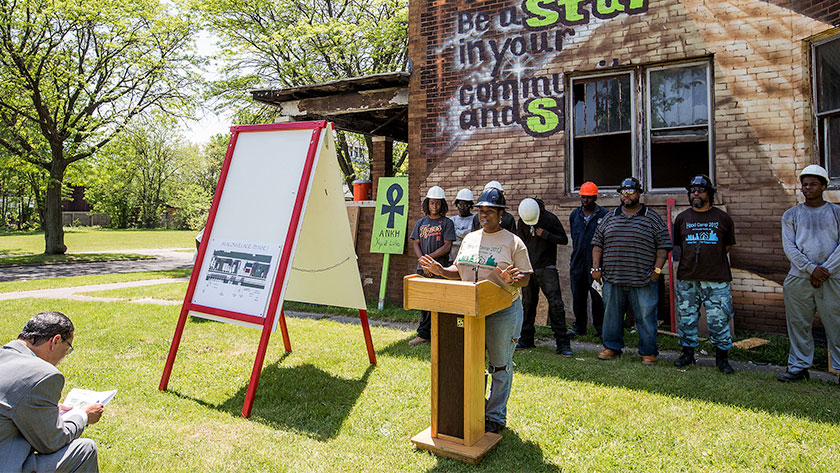Communities at the frontlines of climate, environmental, and social injustices have the wisdom and the solutions to create systemic, transformational change. Historic and persistent structural racism though has meant that these same communities often lack capacity and access to the resources to implement their solutions.
The Justice40 Initiative, announced by the U.S. federal government in the summer of 2021, was an environmental justice turning point. The landmark commitment promises to deliver at least 40 percent of the overall benefits from federal investments in climate and clean energy to disadvantaged communities.
“This moment is critical to advancing and naming racial equity as the both the impediment and solution to helping our country reach our climate and economic goals,” said Christina Cummings, VP Operations at Partnership for Southern Equity. “We need coordination among all levels of government to work in partnership with community to get this right.”

Those closest to the problems are also closest to the solutions
“It is a fact that the US federal government is the largest procurer of goods and services— however, Black and historically disinvested communities of color were almost always excluded from these opportunities to build wealth and benefit from these investments,” said Cummings. “Couple these facts with the reality that federal money can be used to accelerate harm in vulnerable communities, and you have a broken system that was designed to harm.”
The Justice40 Accelerator, a project led by Partnership for Southern Equity in collaboration with Elevate, Groundswell, Hummingbird, and The Solutions Project, seeks to leverage this moment to “radically reimagine the existing government resource delivery system as a restorative and reparative framework that better supports Black and historically disinvested communities of color.”
The Justice40 Accelerator serves frontline community-based organizations by building their capacity to secure funding through the Justice40 Initiative. “The resulting funding levels across energy, water, housing, and transit/transportation will significantly exceed anything possible through philanthropy alone—representing a pivotal opportunity for reparation and restoration of communities,” said Cummings. “Realizing these outcomes will require that we better resource frontline community organizations to take the lead.”
With its suite of resource and capacity-building services, the Justice40 Accelerator supports community organizations working on the frontlines of climate and environmental justice with:
Launching the first cohort of 52 organizations
From a competitive pool of 320 applicant organizations, the first cohort of the accelerator included 52 organizations from across the U.S. and in Puerto Rico. A seven-person external review committee led the selection, managed by Climate Innovation, a Movement Strategy Center network partner with experience in community-driven climate resilience planning. Cummings anticipates launching a second cohort in 2022 for another 64 organizations the committee identified as outstanding.

In September the Accelerator kicked off its cohort experience with a workshop on the federal Justice40 Initiative with Jahi Wise, Senior Advisor for Climate Policy and Finance in the White House Office of Domestic Climate Policy. “The cohort members were honest and direct in sharing their lived experience facing barriers to access and stories of exclusionary practices,” said Cummings. “They also made recommendations to help address the prevalent systemic racism such as shifting from deficit-based to asset-based language, and the need for more capacity-building and predevelopment funding to reduce barriers to access. These leaders reaffirmed that funding, not just technical assistance, is imperative to formulate projects that can successfully compete for federal resources.”
Cummings notes some interesting themes in the capacity building needs of the first cohort, among them: the need to build contracting and procurement muscle, RFP identification and support, peer-to-peer and affinity group support, and opportunities to engage with policy makers, implementers, and government officials to help encourage information exchange and relationship building.
As the Justice40 Accelerator equips its first cohort to start submitting proposals in early 2022, it aims to fundamentally shift the way federal funding works and how those dollars flow. “A system that has accelerated disadvantage and harm can become a tool to heal communities,” said Cummings. “For once in history we have the ability to leverage the might of the federal government in a coordinated way to put resources in the hands of frontline communities so that we create and build a more just and fair society while saving our precious planet.”
Want more stories of transformational change on the world’s most pressing problems? Sign up for our monthly newsletter.
banner image: Alvina Wong, Campaign and Organizing Director for Asian Pacific Environmental Network meeting with community members in Oakland, California